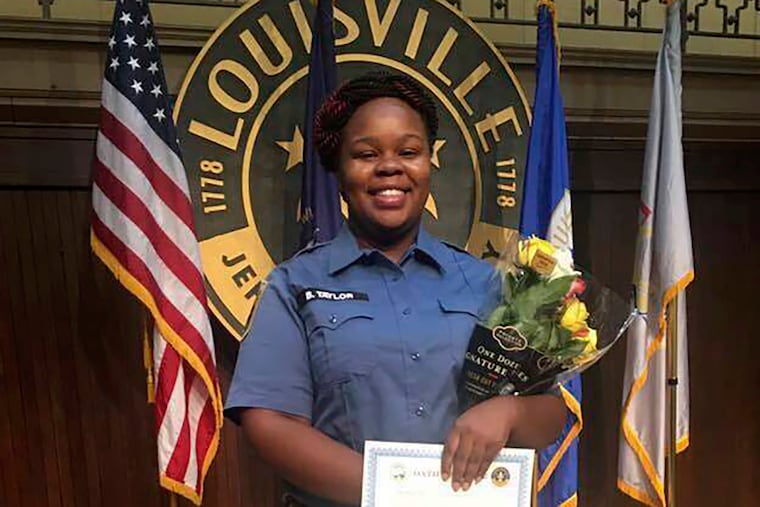Breonna Taylor: Say her name because her Black life mattered | Jenice Armstrong
Don’t come at me with any lame excuses such as “She was dating a drug dealer” or “When the police are shot at they tend to shoot back.” Nothing justifies what happened to Breonna Taylor.

I am so livid about the findings of the grand jury that looked into Breonna Taylor’s murder that it’s hard to put it into words.
I’m also reminded of a much-repeated Malcolm X quote from 1962: “The most disrespected person in America is the Black woman. The most unprotected person in America is the Black woman. The most neglected person in America is the Black woman.”
His words resonate when you consider that no one will be held responsible for Taylor’s death. As a nation, we should be outraged. Her life mattered. Taylor wasn’t just collateral damage that we should just shrug off.
So don’t you dare come at me with any lame excuses, such as “She was dating a drug dealer” or “When the police are shot at they tend to shoot back.” Nothing justifies what happened to her in the wee hours of March 13.
Please pause for a moment and put yourself in the place of the 26-year-old emergency room technician. Imagine being asleep, like she was in her bed, and waking up to what sounds like intruders breaking into your apartment. You are understandably terrified and scream loudly. Suddenly your front door bursts open. Your boyfriend thinks Taylor’s drug-dealing ex has returned, so he shoots and strikes one of the officers in a leg.
» READ MORE: Protesters march through Philadelphia in the wake of the grand jury ruling in Breonna Taylor’s death
Police, who were in plainclothes, respond by firing a hail of bullets into your apartment, mortally wounding you. You are confused as you lie on the floor in your hallway coughing and struggling to breathe. No one bothers to provide you with any medical attention — yet they assist one of their own in getting to a hospital. Authorities search your place but find no drugs.
It’s too late for you, though. All of your hopes and dreams die right there on the floor along with you. You will never marry. You will never have children. You will never own a home.
At first, your story is mostly ignored as the coronavirus pandemic spreads across the country. But your relatives in April file a wrongful-death lawsuit.
The following month, authorities release your boyfriend’s frantic 911 call — it’s just three days after the death of George Floyd in Minneapolis police custody. Demonstrators around the country are chanting not just his name, but yours as well. “Breonna Taylor: say her name" becomes a rallying cry against racial injustice in America.
Attempted murder charges against your boyfriend are dropped and on June 11 Louisville bans no-knock warrants. Beyoncé reaches out to state Attorney General Daniel Cameron on your behalf. Authorities fire Officer Brett Hankison on June 23 for “blindly” firing into your apartment.
You become a cause célèbre. Your face adorns the covers of O magazine and Vanity Fair. Your name is on the lips of people around the world as they cry out, “Say her name: Breonna Taylor!”
» READ MORE: Police officers not charged for killing Breonna Taylor; 1 ex-officer indicted on endangerment charges
On Sept. 15, Louisville officials announce a $12 million settlement with your relatives. It doesn’t come close to replacing what they lost in you.
Supporters hope for justice but it is denied when a grand jury fails to indict any of the officers involved in your murder. It’s a crushing blow, especially since the only person charged is the already-fired officer, who now faces three counts of wanton endangerment because of shots, not directed at you, but into your neighbor’s apartment.
Demonstrators take to the streets shouting your name. Two Louisville police officers are shot but are expected to survive. They are luckier than you. The criminal justice system takes care of its own.
The rest of us, particularly African Americans, get what we get. And though more than half a century has passed, Malcolm’s damning assessment still rings true: “The most unprotected person in America is the Black woman.”